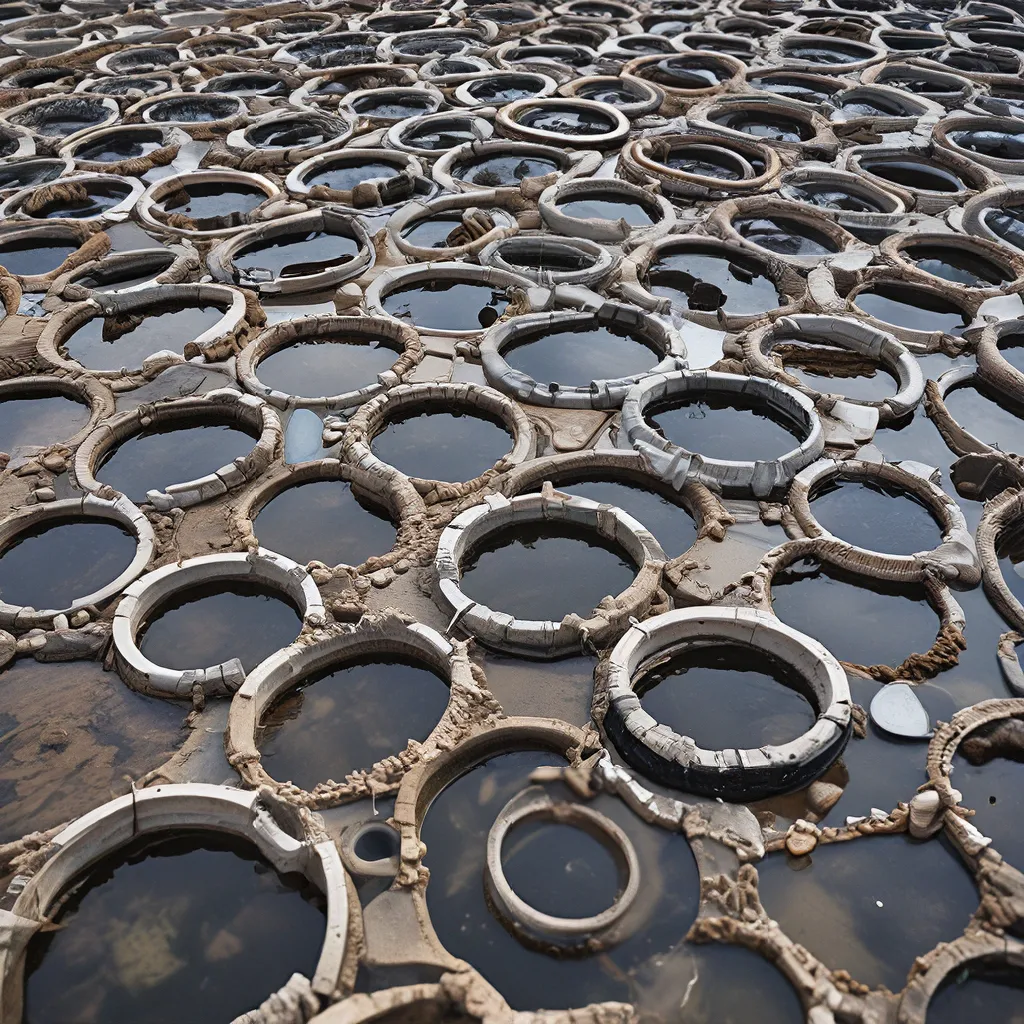
As a self-proclaimed water conservation enthusiast, I’ve always been fascinated by the incredible potential hidden within our wastewater. It’s amazing to think that this often overlooked resource could hold the key to a more sustainable future. That’s why I’m so excited to dive into the world of wastewater treatment and explore how it’s becoming a crucial part of the circular economy.
You see, the traditional linear model of “take, make, and waste” is quickly becoming a relic of the past. Nowadays, forward-thinking industries are embracing the circular economy, where waste is seen as a valuable resource, not just something to be discarded. And at the heart of this shift is the innovative valorization of wastewater.
Unlocking the Hidden Treasure: Wastewater as a Resource
Imagine a world where we could transform our wastewater into a veritable goldmine of useful products. Well, that’s exactly what’s happening in the cutting-edge world of wastewater treatment. Through a process called valorization, researchers and innovators are finding ingenious ways to extract valuable materials and energy from what was once considered mere waste.
One of the most exciting developments in this field is the production of biofuels from wastewater. By harnessing the power of microorganisms, scientists can break down organic matter in wastewater and convert it into biodiesel, biogas, and other renewable energy sources. According to a recent study, this process not only reduces the environmental impact of wastewater, but it also has the potential to generate significant economic benefits for municipalities and water treatment facilities.
But that’s just the tip of the iceberg. Wastewater is also being used to extract valuable metals and minerals, such as phosphorus, nitrogen, and potassium. These essential nutrients can then be repurposed as fertilizers, helping to close the loop in the circular economy. Researchers have even found ways to recover rare earth metals, which are in high demand for a variety of industrial and technological applications.
The possibilities don’t end there. Wastewater can also be used to produce bioplastics, construction materials, and even high-value chemicals. It’s a veritable treasure trove of untapped potential, and the more we explore it, the more we’re likely to uncover.
Embracing the Circular Economy: The Transformative Power of Wastewater
As the world grapples with the pressing challenges of resource scarcity, climate change, and environmental degradation, the circular economy has emerged as a beacon of hope. And at the heart of this transformative shift is the valorization of wastewater.
Recent research suggests that the circular economy approach to wastewater treatment could potentially yield significant environmental and economic benefits. By recovering valuable resources and repurposing them, we can reduce the reliance on virgin materials, minimize waste, and create new revenue streams for water treatment facilities.
But the benefits of this innovative approach go far beyond the bottom line. By embracing the circular economy, we’re also contributing to the sustainability of our communities and the planet as a whole. When we view wastewater as a resource rather than a problem, we open the door to a more resilient and regenerative future.
Imagine a world where wastewater treatment plants are not just facilities for disposing of waste, but rather hubs of innovation and sustainability. Where the by-products of our daily lives are transformed into renewable energy, nutrient-rich fertilizers, and high-value products. This is the promise of the circular economy, and it’s being realized through the power of wastewater valorization.
The Future of Wastewater Treatment: Embracing Innovation and Collaboration
As exciting as the current developments in wastewater valorization are, I can’t help but feel that we’re just scratching the surface of what’s possible. The future of this field is brimming with innovation and collaboration, as researchers, policymakers, and industry leaders work together to unlock the full potential of this untapped resource.
One area that holds particular promise is the integration of advanced technologies into wastewater treatment processes. Artificial intelligence, machine learning, and data analytics are already being used to optimize operations, predict maintenance needs, and identify new opportunities for valorization. Companies like Alpha Wastewater are at the forefront of this technological revolution, using cutting-edge solutions to help municipalities and water treatment facilities maximize the value of their wastewater.
But technology is just one piece of the puzzle. Interdisciplinary collaboration will also be crucial in driving the circular economy forward. By bringing together experts from fields like environmental science, materials science, biotechnology, and engineering, we can tackle the complex challenges of wastewater valorization from multiple angles.
And let’s not forget the importance of public awareness and engagement. As citizens, we all have a role to play in the circular economy. By understanding the value of wastewater and supporting innovative solutions, we can help create a more sustainable and resilient future for our communities.
So, what does the future of wastewater treatment hold? Based on the incredible progress we’ve seen so far, I’d say it’s bright, innovative, and full of promise. The circular economy is no longer just a dream – it’s a reality that’s being shaped by the visionaries and problem-solvers who are redefining the way we think about waste.
And who knows, maybe one day we’ll even be able to turn our wastewater into liquid gold. The possibilities are truly endless, and I, for one, can’t wait to see what the future has in store.